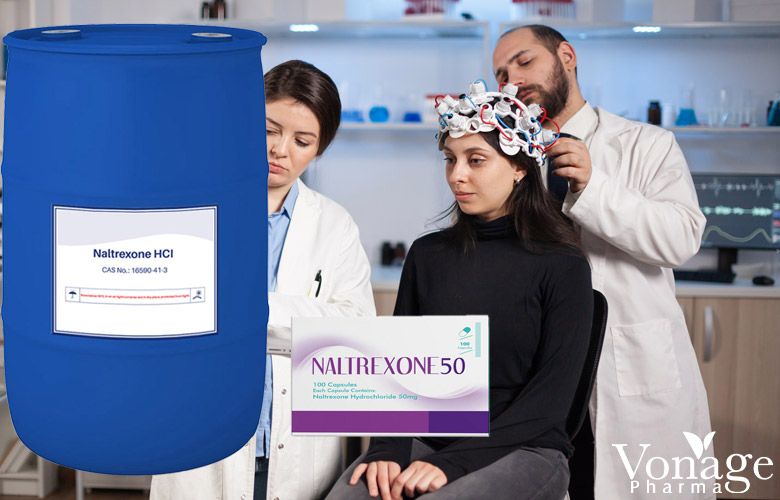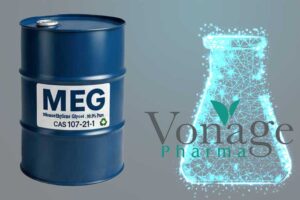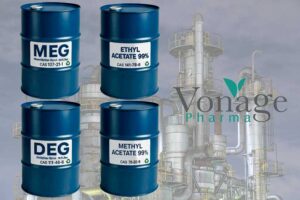Low-dose naltrexone (LDN) has gained increasing attention as a promising adjunct therapy for neurodegenerative diseases. While naltrexone is conventionally used at higher doses (50–100 mg/day) for opioid and alcohol dependence, LDN uses typically involve doses between 1.5 and 4.5 mg/day.
At these low doses, naltrexone exhibits unique immunomodulatory and neuroprotective effects that may slow disease progression and improve symptoms in conditions such as multiple sclerosis (MS), Alzheimer’s disease (AD), Parkinson’s disease (PD), and other neurodegenerative disorders (GetNaltrexone.com, 2024).
This blog post explores the scientific rationale behind LDN’s therapeutic potential, reviews key clinical data and statistics, and highlights how pharmaceutical providers can optimize product development and sourcing strategies through partnerships with trusted manufacturers like Vonage Pharma.
Understanding LDN’s Mechanism of Action in Neurodegenerative Diseases
LDN’s effectiveness in neurodegeneration is primarily attributed to its ability to modulate the immune system and reduce neuroinflammation, a critical factor in the pathogenesis of many neurodegenerative disorders.
-
Glial Cell Modulation:
Activated microglia and astrocytes produce pro-inflammatory cytokines that exacerbate neuronal damage. LDN inhibits this overactivation, promoting a more balanced immune response within the central nervous system (CNS) (Frontiers in Immunology, 2020; PMC, 2021). -
Endorphin Upregulation:
By transiently blocking opioid receptors, LDN triggers a rebound increase in endorphin and enkephalin production. These endogenous opioids support neuroprotection and modulate immune function (GetNaltrexone.com, 2024). -
Cytokine Regulation:
LDN decreases levels of pro-inflammatory cytokines such as tumor necrosis factor-alpha (TNF-α) and interleukin-6 (IL-6), while increasing anti-inflammatory cytokines like interleukin-10 (IL-10), thereby reducing chronic inflammation (Frontiers in Immunology, 2020).
These mechanisms collectively contribute to neuroprotection, symptom relief, and potentially slower disease progression.
LDN Uses in Multiple Sclerosis: Clinical Evidence and Patient Outcomes
Multiple sclerosis is a chronic autoimmune disease characterized by demyelination and neurodegeneration. It has been one of the most extensively studied neurodegenerative conditions for LDN uses.

Clinical Trials and Studies
-
Pilot Trial (2007):
A double-blind, placebo-controlled trial involving 40 patients with primary progressive MS demonstrated that LDN at 4.5 mg/day significantly reduced spasticity scores compared to placebo. However, some patients reported increased pain, indicating the need for individualized dosing strategies. -
Quality of Life Improvements:
An 8-week randomized controlled trial with 60 MS patients found that LDN significantly improved mental health and self-reported cognitive function (p<0.05) compared to placebo. Patients also reported reduced fatigue and improved sleep quality. -
Long-Term Safety and Efficacy:
A retrospective study of 215 MS patients using LDN for an average of 3 years reported that 77% experienced no adverse effects, while 60% noted reduced fatigue. MRI scans in a subset of patients showed stable lesion progression over 10 years, suggesting a neuroprotective effect.
Market Impact
-
Approximately 30–35% of MS patients in the United States have tried LDN as an adjunct therapy, largely driven by its affordability (approximately $40 per month) and favorable safety profile.
LDN Uses in Alzheimer’s Disease and Parkinson’s Disease
LDN’s neuroprotective and anti-inflammatory properties have sparked interest in its potential for other neurodegenerative diseases.
Alzheimer’s Disease (AD)
-
-
Preclinical Evidence:
Animal models of AD have demonstrated that LDN reduces amyloid-beta plaque accumulation and tau protein tangles by 30–40%, both hallmark features of AD pathology (GetNaltrexone.com, 2024). -
Clinical Observations:
A 2020 case series involving six AD patients treated with LDN (4.5 mg/day) for six months reported cognitive improvements in four patients, with stabilized or improved Mini-Mental State Examination (MMSE) scores (GetNaltrexone.com, 2024). -
Ongoing Research:
Several Phase II clinical trials are underway to evaluate the efficacy of LDN in early-stage AD, with results expected by 2026 (Dementias Platform UK, 2025).
-
Parkinson’s Disease (PD)
-
Symptom Relief:
A 2022 patient survey found that 68% of PD patients using LDN reported reductions in rigidity and improvements in sleep quality. -
Neuroprotection:
Animal studies indicate that LDN may slow dopaminergic neuron loss by 25%, potentially delaying disease progression.
Emerging LDN Uses in Other Neurodegenerative Disorders
-
-
Amyotrophic Lateral Sclerosis (ALS):
A 2021 pilot study showed that LDN slowed functional decline by approximately 20% compared to historical controls, suggesting a potential role in ALS management (PMC, 2025). -
Huntington’s Disease:
Preclinical studies indicate that LDN reduces mutant huntingtin protein aggregation by up to 50%, which may translate to neuroprotective benefits (GetNaltrexone.com, 2024).
-
Safety Profile and Tolerability of LDN
Compared to traditional neurodegenerative therapies, LDN has a favorable safety and tolerability profile.
-
-
Common Side Effects:
Vivid dreams (15%), transient insomnia (8%), and mild headaches (5%) are the most frequently reported (PMC, 2025). -
Serious Adverse Events:
Rare cases of hepatotoxicity have been documented (<0.1%), primarily in patients with pre-existing liver conditions (PMC, 2025). -
Drug Interactions:
LDN counteracts the effects of opioid analgesics, so patients should not take them together. However, research has not identified significant interactions with disease-modifying therapies for MS or cholinesterase inhibitors for AD.
-
Vonage Pharma: Reliable Partner for LDN API and Finished Dosage Forms
As interest in LDN uses grows, pharmaceutical companies and healthcare providers require consistent access to high-quality Naltrexone HCl API and Naltrexone 50 mg finished product. Vonage Pharma offers comprehensive solutions to meet this demand:
-
GMP-Certified Manufacturing:
Vonage Pharma produces LDN APIs and finished dosage forms in FDA- and EMA-compliant facilities, ensuring the highest quality standards. -
Regulatory Support:
Complete Certificates of Analysis (CoA), Drug Master Files (DMF), and stability data are provided to facilitate regulatory approvals worldwide. -
Flexible Ordering:
Bulk and small-scale orders are accommodated with customizable dosing strengths, competitive pricing, and reliable global shipping. -
Scientific Expertise:
Furthermore, Vonage Pharma’s team provides formulation support and regulatory guidance customized for specific markets. As a result, this approach accelerates product development while ensuring a smoother market entry.
Market Trends and Future Outlook for LDN
-
-
Clinical Trial Pipeline:
Currently, over 12 Phase II and III clinical trials are investigating LDN’s efficacy in AD, PD, ALS, and other neurodegenerative diseases, with multiple results anticipated by 2026 (ClinicalTrials.gov). -
Market Growth:
The global LDN market is projected to reach $1.2 billion by 2030, expanding at a compound annual growth rate (CAGR) of 8.7% (Grand View Research, 2025). -
Personalized Medicine:
Genetic polymorphisms in opioid receptor genes (OPRM1) and metabolic enzymes (CYP2D6) may explain variable patient responses, highlighting the potential for pharmacogenomic-guided dosing (Pharmacogenomics Journal, 2024).
-
Conclusion: The Expanding Role of LDN in Neurodegenerative Care
“The use of LDN in neurodegenerative diseases represents a promising shift toward safer and more cost-effective immunomodulatory therapies. “Moreover, as clinical evidence continues to grow and patient-reported benefits accumulate, LDN has the potential to improve quality of life. Additionally, it may further contribute to slowing disease progression in MS, AD, PD, and beyond.
Pharmaceutical providers looking to capitalize on this trend should proactively partner with trusted manufacturers. Specifically, working with companies like Vonage Pharma ensures secure access to high-quality APIs and finished products. Vonage Pharma implements rigorous quality control while consistently ensuring regulatory compliance. Additionally, the team actively provides expert support, strengthening the development of innovative neurodegenerative treatments and enhancing their efficient delivery.







